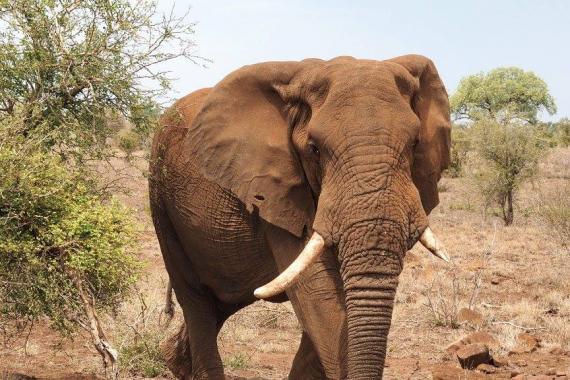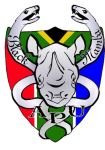The Black Mambas
Current initiative
Published

Elephant in Kruger National Park.
The Black Mambas Anti-Poaching Unit was founded in 2013 by Transfrontier Africa NPC to protect the Olifants West Region of Balule Nature Reserve in South Africa. They are not only rangers but also role models for the rest of the community. Whilst the main objective is the security of the reserve and the protection of wildlife, the Black Mamba initiative educates the communities that live on the boundaries of Balule and the Greater Kruger Park to install a proud, sympathetic and patriotic community with pro-environmental ethos.
Lead

Location
The Black Mamba Anti-Poaching Unit (APU) is the first predominantly all-female anti-poaching unit in South Africa. The teams operate within Balule Nature Reserve, part of the Greater Kruger National Park. The Park is fenceless to aid movement of animals throughout the landscape.
The poaching and wildlife trade problem
Species affected African Elephant Loxodonta africana , Lion Panthera leo
Products in tradeAfrican Elephant: In the early 1970s, demand for ivory soared and the amount of ivory leaving Africa rose to levels not seen since the start of the century. Most of the ivory leaving Africa was taken illegally and over 80% of all the raw ivory traded came from poached elephants. This illegal trade was largely responsible for the dramatic decline in the African elephant population.
Lion: The lion is the latest species swept up in IWT for the Asian 'medicinal' market. As wild tiger populations dwindle, poachers are turning to lions to feed the insatiable appetite for ‘potions’ made from cat bones and sold as Chinese “remedies”. Lion bones are virtually indistinguishable from tiger bones, and bones from wild lions are considered more efficacious than those bred in captivity.
Rhino: Rhino poaching has escalated dramatically in recent years and is being driven by the demand for rhino horn in Asian countries, particularly Vietnam and China, due to its use as a status symbol to display someone’s success and wealth and in Traditional Chinese Medicine.
Pangolins: IWT in pangolins is growing, primarily to meet demands in East Asia for both their meat and their scales, which are roasted and used, like rhino horn, in traditional medicines. Demand has increased in recent years and the illegal trade also grows within Africa.
Overview of the problem
Poachers, primarily from local communities as well as poaching gangs and individuals from further afield, have targeted Balule Nature Reserve and the surrounding area, partly because of the ease of access and the lure of lucrative, highly sought after wildlife such as the rhino and elephant.
Hoedspruit is the closest town. It has about 3500 inhabitants, a high unemployment rate (40%), persisting poverty, and 21% of people over 20 years have no education.
A small number of indigenous people live on Balule Nature Reserve land and some of them work for lodges or private landowners. Some indigenous people employed on the reserve have set snares and cages, which threaten all wildlife due to their indiscriminate nature: bushmeat harvesting occurs because of local tradition and tribal culture, and for sustenance given the poverty and high levels of unemployment in the area.
The anti-IWT initiative
Anti-Poaching
The Black Mamba APU was created by Transfrontier Africa NPC in 2013. From an initial six members, there are now more than 30 members of the Black Mamba APU, most of whom are women, and from local communities surrounding the Balule Reserve and Greater Kruger national park. For many Black Mambas, this is their first job after high school.
The Black Mambas are the first line of defence providing boots on the ground and are responsible for the early detection of poaching insurgents through monitoring and surveillance during their daily patrols. This allows for our armed units to remain within the reserve with the ‘assets’.
Their role in the protection of wildlife consists of 'visual policing' and early detection through pulling out snares, conducting roadblocks, patrolling boundaries, night patrols and observations, assisting in VHF rhino tracking plus other ecological management duties.
Observation and listening posts are stationed in critical areas such as known entry and exit points or popular rhino waterholes for signs of poisoning. Disruptive patrols are performed within areas of high rhino density to thwart attempts to poach rhino. Road Blocks involve searching know and unknown vehicles for any illegal or suspicious items. Building sites and staff compounds within the reserve are searched regularly to gather intelligence and ensure all reserve rules are being adhered to and regular sweeps are conducted throughout the Reserve and neighbouring Tribal lands in search of snares.
Finding and destroying snares as well as poacher’s camps and bushmeat kitchens forces these poachers to leave the area as they gain no reward for their efforts.
Wages are funded by the Department of Environment, Forestry and Fisheries – Chief Directorate: EPIP through the Environmental Monitor Program. Transfrontier Africa NPC covers all other costs such as equipment, uniforms, food and training. Each member spends 21 days/month patrolling the reserves. They start each day, military style, with a parade and then issued orders before patrols leave on their missions. Each Black Mamba is outfitted in ranger uniforms, trained in tracking and combat - but work unarmed.
The Black Mambas work to the concept of the "Broken Window" philosophy and strive to make their area of influence the "most undesirable, most difficult and least profitable place to poach".
Education
The objectives of the Black Mamba project is not only the protection of wildlife through boots on the ground but also through being a role model in their communities. They want their communities to understand that there are far greater benefits to them through rhino conservation rather than poaching.
Schools are visited on a weekly basis, by the Black Mamba Environmental Education Officer, and Black Mamba Rangers make regular visits to the schools to teach students about poaching and how they are working to protect these species and how it's affected them personally as well as improving conservation outcomes.
The Bush Babies Environmental Education Program: learners are the ‘Babies’ of the community learning about the ‘Bush’. With the support of local communities, tribal authorities and participating schools the Bush Babies Program is now at 10 schools within the communities boarding the western boundary of Kruger National Park. Currently, reaching 870 children aged between 12-15 years old, we aim to create an environmentally literate community.
The Program is interlinked into the curriculum of the local schools and aims to bring 'knowledge to life' whilst raising awareness about their surrounding environment, providing a better understanding of conservation and promoting and encouraging sustainable use of resources and ultimately installing an ethical ethos in future generations.
Inclusion of gender, age and ethnic groups
Members of the Black Mambas APU are primarily women from nearby communities. It is hoped they will become role models of environmental stewardship and improve the social and economic welfare of their community.
The strategy
Strengthening disincentives for illegal behaviour
The Black Mamba APU act as Environmental Monitors. The Black Mambas are mostly women that undertake foot-patrols, observations, vehicle checks, roadblocks and intelligence gathering from their communities.
Each Black Mamba is outfitted in ranger uniforms, trained in tracking and combat, but work unarmed: they protect the animals by creating a "visible police presence.
All Black Mamba recruits are from local, previously disadvantaged communities who undertake a 6-week training programme with an existing unit prior to deployment.
They receive rations during onsite rotations as well as uniforms and personal care items. Members of the anti-poaching units also benefit from training and certification, and visibility in media and publications.
Increasing livelihoods that are not related to wildlife
'Dress me to learn' is a new initiative to buy a ‘needy’ child school shoes and/or uniforms for learners. This was implemented as most of the learner’s school shoes are torn or broken due to the long distances they have to walk to get to school. It is believed that learners getting new shoes will boost their confidence not only personally, but also within the learning environment as they will no long fell self-conscious of their dress code.
Improving education and awareness
Further detailThe Black Mambas also educate their peers and the community's children on wildlife conservation. There are 6 education programs:
- The Mini Bush Babies Program - Aimed towards learners in grade 2 or 3 aged between 7 – 9 years, it is a one day course that educates the learners about conservation on a less formal teaching approach, with the aim to make it more hands-on and as vocal as possible.
- The Bush Babies school program - The Bush Babies are well known for the environmental education program it offers to 10 local schools on a weekly basis. Children are between the ages of 12- 17 years (Grade 6 – 7) and the program is interlinked into the school curriculum. This program offers in-depth introductions into Conservation, ecology, the big five and the importance of rhino's over the course of the academic year.
- School holiday program - Offered four times per year to learners whose parents are employed within the reserve. The program runs for 4-5 days and can host a maximum of 20 children at a time. The program material is very similar to the school program only more hands on.
- Nature Guardians - are hand-picked senior Bush Babies whose purpose is to maintain the natural appearance of their schools, ensuring that all pupils practice the environmental ethics of keeping their school clean and litter free.
- Environmental camps - are a reward to the top achievers of the school program throughout the course of the year and who must obtain 70% or higher to qualify.
- Elders in the park - This program is developed for the grandparents of the bush babies’ learners aged 60 years and above. It is specially developed for the grandparents that have never been into the Kruger National Park although they have lived on its boundaries their entire lives.
Has the initiative made a difference?
Ever since the project started the reserve has had almost no poaching. By 2015, Black Mamba APU had enabled the arrest of six poachers, shut down five poacher's camps and reduced snaring of wildlife by 76% since 2013, with no rhinos were poached during a 10 month period. More recent figures show that poachers entering the reserve has reduced by 89%.
Within their communities, the Black Mambas have become village heroes and they now have a strong sense of pride, bolstered by the knowledge that they are doing what is thought of as 'a man's job'.
The Bush Babies program has reached over 2,000 children. The program has built schools and educated people on the perils of being a poacher.
What works and why
Employing women has improved social welfare in the community as most of the women in the unit send their money home so their families can pay the bills, whereas men in these communities tend to use money for themselves.
Organisers, donors and partners
Sponsors: Aalborg Zoo, Africa Tours travel agency, Elephants Alive, Flying for Rhino and Conservation, The Endangered Wildlife Trust, Hi-Tec Sports, Kansas City Zoo, Kruger to Canyon Biosphere's Environmental Monitor Programme, Point Foundation, The Perfect World Foundation, The Platter Project, Rocking for Rhinos, Veterans for Wildlife.
Fundraising sponsors: Anna Rosholt Jewellery Design, Cleve Hicks, Helping Rhinos, Maidknew, My Green World, Pennies for Eles, PJ Kombucha, Pondoro Game Lodge, Rhino Mercy, Rettet das Nashorn
All sponsors and partners can be found here.
For further information contact (peoplenotpoaching@gmail.com).